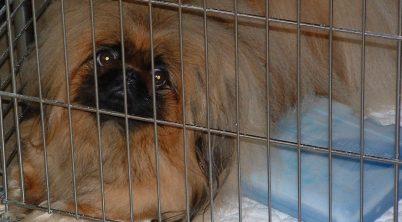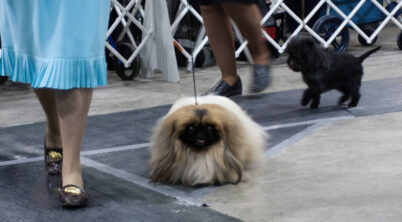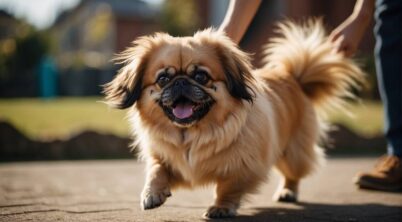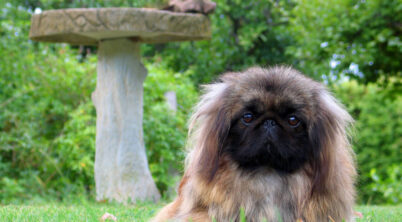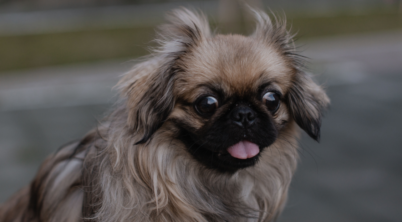Factors and Tips for a Healthy, Long Life
The Pekingese, a toy dog breed known for its “lion’s mane” of long hair and compact, stocky build, has quite a history with ancient Chinese royalty. Recognizable by its short snout, large eyes, and V-shaped facial wrinkle, this breed has an endearing appearance that has caught the attention of dog lovers throughout the years. As a potential or current Pekingese owner, understanding the breed’s lifespan and health concerns is important when it comes to providing the best care for your furry companion.
Typically, a Pekingese can be expected to live 12 to 14 years, with some even reaching an impressive 15 years when properly cared for. It’s worth noting that these small dogs are mainly healthy, although they are predisposed to a few minor health problems. Some of these issues include elongated soft palate, patellar luxation, stenotic nares, and skin fold dermatitis, all of which could impact their overall quality of life.
When caring for a Pekingese, regular grooming and occasional baths are essential to maintain their beautiful coat while preventing matting and removing loose hair. Additionally, regular vet visits and investing in pet health insurance can help ensure that any medical conditions are diagnosed and treated early, providing your Pekingese with the opportunity to enjoy a long and happy life.
Pekingese Dog Lifespan
The typical lifespan of a Pekingese dog ranges from 12 to 14 years. These compact, stocky toy dogs can weigh up to 14 pounds and are known for their loyalty and unique personality traits. However, the length and quality of their life can be affected by various factors, including genetic conditions, diet, and access to proper veterinary care.
Factors Affecting Lifespan
Health Conditions
Pekingese are prone to some health issues that can impact their lifespan. Some of the common conditions include:
- Elongated soft palate
- Patellar luxation
- Stenotic nares
- Keratoconjunctivitis Sicca (KCS)
- Trichiasis
- Corneal abrasions
- Distichiasis
- Skin fold dermatitis
While these conditions can be managed with regular veterinary care, it is essential to be aware of them and take preventive measures when possible.
Diet and Exercise
A well-balanced diet and regular exercise regimen can have a significant impact on a Pekingese dog’s overall health and lifespan. Overfeeding or providing an unbalanced diet can lead to obesity, which can contribute to various health problems. It is crucial to feed your Pekingese a diet tailored to their specific needs, considering factors like their age, weight, and activity levels. Additionally, regular exercise helps maintain muscle tone, prevents obesity, and keeps the dog mentally stimulated, improving overall quality of life.
Veterinary Care
Regular veterinary check-ups are critical in maintaining a Pekingese’s health and prolonging their life. Early detection of potential health issues allows for timely intervention and treatment, which can prevent deterioration in the dog’s health. Proper dental care, vaccination schedules, and routine health screenings will contribute to a longer, healthier life for your Pekingese.
In conclusion, the typical lifespan of a Pekingese dog is 12 to 14 years, with several factors influencing it. By being aware of potential health issues, providing a well-balanced diet and exercise, and ensuring consistent veterinary care, you can help your Pekingese live a long and healthy life.
Diet and Exercise
Diet
A well-balanced diet is essential for a Pekingese’s overall health and longevity. Feeding them high-quality dog food, specifically designed for small breeds, helps to meet their unique nutritional needs.
- Make sure to follow the feeding guidelines provided by the dog food manufacturer.
- Split the recommended daily portion into two or more meals.
- Avoid feeding human food as it can lead to obesity and other health problems.
- Always ensure clean, fresh water is available.
Exercise
Even though Pekingese is a small breed with low exercise requirements, providing them with daily physical activity is essential for a healthy and happy life.
- Short walks of at least 20-30 minutes each day are recommended.
- Indoor playtime or engaging in interactive games are alternative options for expending energy.
- Due to their brachycephalic nature, avoid exercise in high temperatures or humidity as it can lead to breathing difficulties.
Remember, maintaining a healthy diet and regular exercise routine helps to prevent obesity and promotes a longer lifespan for Pekingese dogs. Make sure to consult with a veterinarian for personalized advice on their diet and exercise needs.
Health Issues
Pekingese dogs typically have a lifespan of 12-14 years. Although they are mostly healthy, these dogs are prone to certain health conditions which can impact their quality of life.
Some common health problems in Pekingese dogs include:
- Brachycephalic Airway Syndrome: This condition is caused by the dog’s short face and can lead to breathing difficulties due to the narrowing of their airways.
- Elongated Soft Palate, Stenotic Nares, and Tracheal Collapse: These issues are related to the dog’s respiratory system and can cause various symptoms such as snoring, coughing, and even difficulty breathing.
- Keratoconjunctivitis Sicca (KCS): Also known as “dry eye,” KCS is caused by reduced tear production and can lead to discomfort and vision problems if left untreated.
- Eye Issues: Pekingese dogs are prone to various eye conditions, such as trichiasis, corneal abrasions, and distichiasis, which can cause irritation and vision problems.
- Patellar Luxation: This orthopedic condition occurs when the kneecap slips out of its proper position, causing pain and difficulty walking.
- Skin Fold Dermatitis: Due to their facial folds, Pekingese dogs are susceptible to skin infections caused by trapped moisture and bacteria.
Preventive measures, such as regular check-ups with a veterinarian and maintaining a healthy weight, can help reduce the risk of these health issues. Additionally, early detection and treatment can greatly improve a Pekingese dog’s quality of life and overall health.
Grooming and Care
Pekingese dogs have a unique coat that requires regular grooming to maintain its appearance and health. Frequent brushing, at least two to three times a week, helps prevent tangles and matting and keeps their coat looking its best.
Face Cleaning
Given their distinct facial features, Pekingese dogs require special attention to their faces. It’s essential to clean their faces regularly, preferably once a week. Use a damp cloth or sponge (without soap) to gently wipe the face, focusing on the skin folds where dirt and debris may collect. Adding a few drops of vinegar to the cloth can help reduce odor.
Bathing
Bathing is not necessary too often for Pekingese dogs, as regular grooming can keep their coats clean. However, it is recommended to bathe them once every three months. This will prevent their coat from becoming too oily, dirty and tangled. Ensure to use a gentle dog shampoo and clean their coat thoroughly to avoid any bad odor.
Nail Trimming and Ear Cleaning
Regular nail trimming is necessary for Pekingese dogs to keep their nails at a healthy length. Trim their nails once a month at least or as needed. Additionally, check their ears for any signs of irritation or infection and clean them gently using a soft, damp cloth or a cotton ball. Avoid using cotton swabs to prevent damaging their ear canals.
These grooming and care practices will help ensure that your Pekingese dog remains clean, healthy, and comfortable throughout its lifespan, which typically ranges from 12 to 14 years.
Final Thoughts
The Pekingese is a small, regal dog breed that has been around for centuries, originating from ancient China. This breed has a distinct appearance and a unique, rolling gait. It weighs between 7 to 14 pounds and grows to a height of 6 to 9 inches. Owning a Pekingese can be a rewarding and enjoyable experience, with an average lifespan of 11.4 to 15 years.
However, as with any other breed, it is essential to understand that the Pekingese requires proper care throughout its life to ensure a long, healthy existence. Some minor health issues that may affect Pekingese dogs include elongated soft palate and patellar luxation. To keep your Pekingese in the best possible health, consider the following:
- Regular veterinary check-ups: This helps in the early detection and treatment of any health problems, allowing your Pekingese to live a more extended, healthier life.
- Proper diet and nutrition: Ensure that your Pekingese receives a balanced diet with the right nutrients to maintain optimum health.
- Exercise: Although they may not require much exercise, providing daily walks and playtime will help keep your Pekingese fit and mentally stimulated.
In conclusion, the Pekingese is a loyal and loving companion with a lifespan of 11.4 to 15 years. Proper care through regular veterinary check-ups, a balanced diet, and exercise will contribute to the longevity of this beloved breed. Remember to always provide love and affection to strengthen the bond between you and your Pekingese throughout its life.


